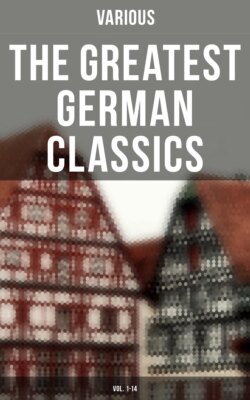Читать книгу The Greatest German Classics (Vol. 1-14) - Various - Страница 1493
На сайте Литреса книга снята с продажи.
ROME
ОглавлениеTable of Contents
Winckelmann was at last in Rome, and who could be worthier to feel the influence which that great privilege is able to produce upon a truly perceptive nature! He sees his wish fulfilled, his happiness established, his hopes more than satisfied. His ideals stand embodied about him. He wanders astonished through the ruins of a gigantic age, the greatest that art has produced, under the open sky; freely he lifts his eyes to these wonderful works as to the stars of the firmament, and every locked treasure is opened for a small gift. Like a pilgrim, the newcomer creeps about unobserved; he approaches the most sublime and holy treasures in an unseemly garment. As yet he permits no detail to distract him, the whole affects him with endless variety, and he already feels the harmony which finally must arise for him out of these infinitely diversified elements. He gazes upon, he examines everything, and to make his happiness complete, he is taken for an artist, as every one in his heart would gladly be.
In lieu of further observations, we submit to our readers the overpowering influence of the situation, as a friend has clearly and sympathetically described it.
"Rome is a place where all antiquity is concentrated into a unity for our inspection. What we have felt with the ancient poets, concerning ancient forms of government, we believe more than ever to feel, even to see, in Rome. As Homer cannot be compared with other poets, so Rome can be compared with no other city, the Roman country with no other landscape. Most of this impression is no doubt due, it is true, to ourselves, and not to the subject; but it is not only the sentimental thought of standing where this or that great man has stood, it is an irresistible attraction toward what we regard as—although it may be through a necessary deception—a noble and sublime past; a power which even he who wished to cannot resist, because the desolation in which the present inhabitants leave the land and the incredible masses of ruins themselves attract and convince the eye. And as this past appears to the mind in a grandeur which excludes all envy, in which one is more than happy to take part, if only with the imagination (indeed, no other participation is conceivable); and as the senses too are charmed by the beauty of form, the grandeur and simplicity of the figures, the richness of the vegetation (though not luxuriant like that of a more southern region), the precision of the outlines in the clear air and the beauty of the colors in their transparency—so the enjoyment of nature is here a purely artistic one, free from everything distracting. Everywhere else the ideas of contrast appear and the enjoyment of nature is elegiac or satiric. It is true that these sentiments exist only for us. To Horace, Tibur seemed more modern than does Tivoli to us, as is proved by his 'Beatus ille qui procul negotiis,' but it is only an illusion to imagine that we ourselves would like to be inhabitants of Athens or Rome. Only in the distance, separated from everything common, only as a thing of the past, must antiquity appear to us. This is the sentiment of a friend and myself, at least, in regard to the ruins; we are always incensed when a half sunken ruin is excavated; for this can only be a gain for scholarship at the expense of the imagination. There are only two things which inspire me with an equal horror: that the Campagna di Roma should be built up, and that Rome should become a well policed city, in which no man any longer carried a knife. Should such an order-loving Pope appear—which may the seventy-two cardinals prevent—shall move away. Only if such divine anarchy and such a heavenly wilderness remain in Rome, is there place for the shadows, one of which is worth more than the whole present race."
